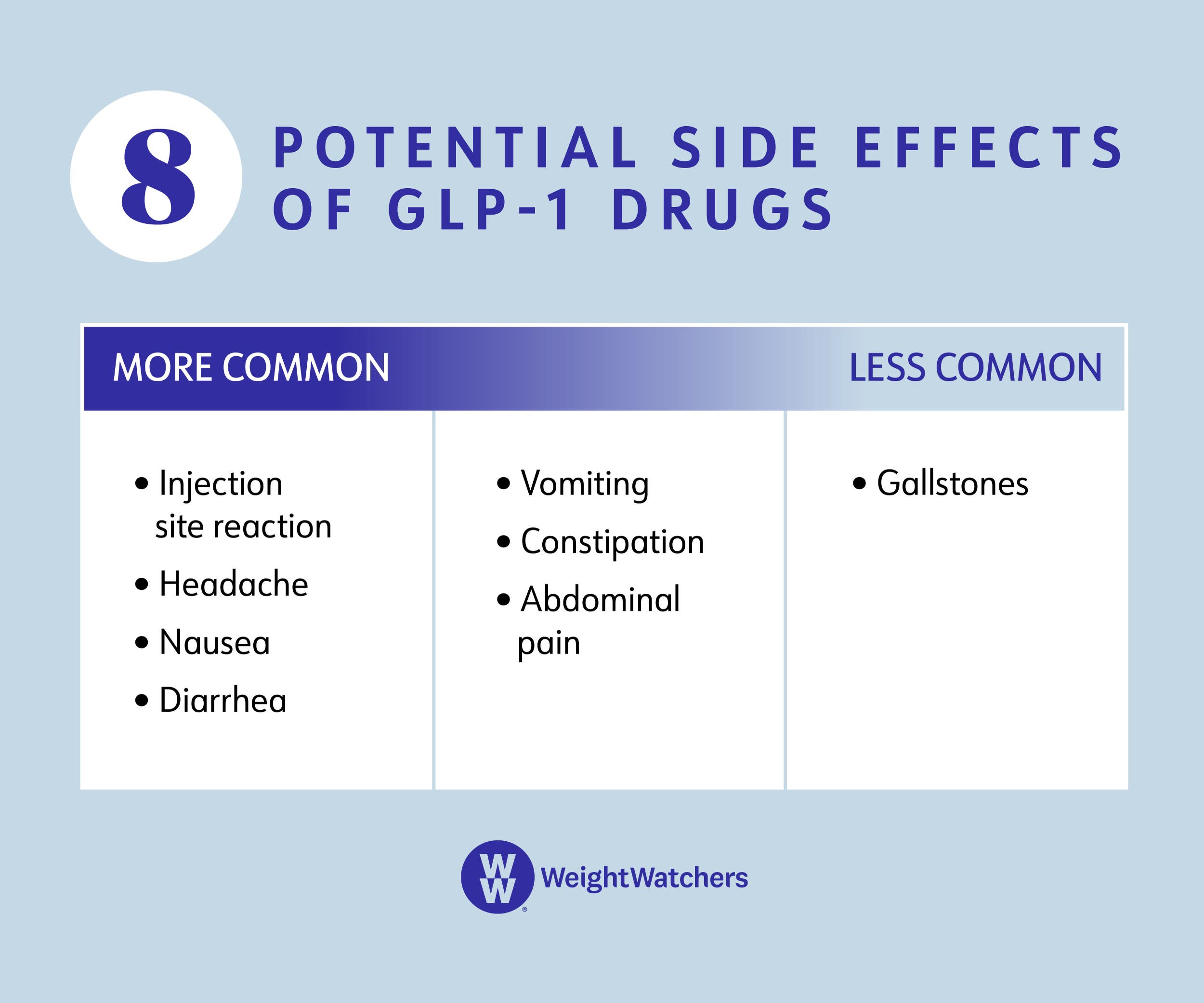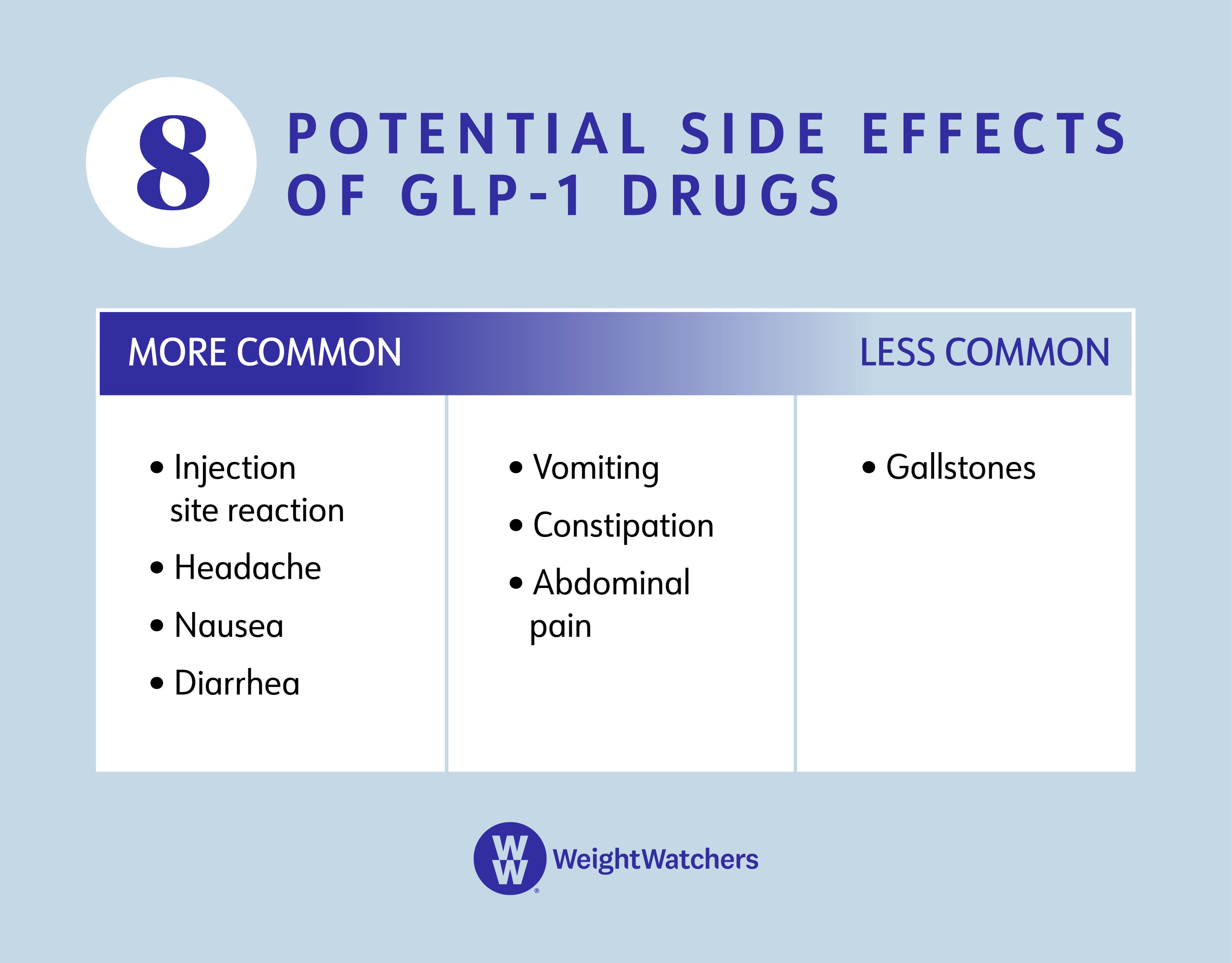Weight loss medication side effects — and how to manage them


In this article:
1/ Common side effects of weight-loss medications
2/ Serious side effects of weight-loss medications
3/ What are the top FDA-approved medications for weight loss?
4/ Possible side effects of GLP-1s (Wegovy, Saxenda, Zepbound)
5/ Possible side effects of naltrexone/bupropion HCL (Contrave)
6/ Possible side effects of phentermine/topiramate ER (Qsymia)
7/ Possible side effects of orlistat (Xenical/Alli)
8/ How to manage weight loss medication side effects
10/ FAQs
The conversations about prescription weight-management medications tend to focus on the results: losing weight, cutting food noise, and reducing health risks. And while those are all true, an important part of the conversation is often missing: the uncomfortable, unpleasant side effects these weight-loss medications often cause.
Some are mild, while others can be intense. Some affect your G.I. system, while others mess with your sleep. Here are the potential side effects for various weight loss medications — and more importantly, how you can make them less severe, so the benefits of the medication don’t feel like such a trade-off.
Common side effects of weight loss medications
Many people who experience the most common side effects from weight loss medications say they resolve after their bodies adjust to the new medications, while others have side effects that persist. The most common side effects include:
- G.I. issues: This can include nausea, vomiting, stomach cramps, bloating, constipation, and diarrhea.
- Fatigue: Feeling tired or even exhausted is a common side effect.
- Headache or dizziness: This can be caused by the medication itself, or by the medication making you less likely to drink water or consume enough calories, either of which can lead to feeling light-headed, dizzy, or headachey.
- Loss of appetite: This is part of what helps you lose weight on the medications, but can also lead to too much of a lack of hunger.
Serious side effects of weight loss medications
Much fewer people are hit with rarer, more severe, side effects. These include:
- Gallstones: Associated with GLP-1s, the risk of gallstones is less than 2%. Gallstones, which are small, rock-like deposits of hardened digestive fluid, may occur because GLP-1 agonists can delay the emptying of bile from the gallbladder.
- Birth issues: The FDA recommends GLP-1s not be taken during pregnancy and be discontinued at least two months prior to pregnancy, because animal studies demonstrate it may cause higher rates of miscarriage and birth defects; Qsymia may also cause birth defects.
- Mental health issues: Contrave may increase anxiety, insomnia, irritability, and a very small risk of suicidal thoughts and behaviors.
- Pancreatitis: GLP-1s can contribute to pancreatitis, or inflammation of the pancreas that can lead to complications if left untreated.
- Hypoglycemia: This is when blood sugar drops too low, and can happen if you’re already taking a medication to control blood sugar.
- Thyroid cancer: While GLP-1s may carry a small increased risk of medullary thyroid cancer, studies have only shown this on animals, not in humans.
- Vision changes: Qsymia’s side effects include eye issues that can lead to permanent vision loss if not treated.
- Issues during surgery: Since GLP-1 medications slow food going through your system, there’s an increased risk of food getting into your lungs during surgery or other procedures that use anesthesia/sedation. Your doctor can advise you how far in advance to discontinue the medication, as well as food and liquids.
What are the top FDA-approved medications for weight loss?
The FDA has approved several medications for treating obesity, and each works a little differently. They include:
- Semaglutide (Wegovy): A GLP-1 agonist, which triggers hormonal activity to keep blood sugar low, reduce cravings, and increase feelings of fullness.
- Liraglutide (Saxenda): The first of the FDA-approved GLP-1 agonists, on the market since 2014.
- Tirzepatide (Zepbound): A combination GLP-1 agonist and GIP agonist, which acts similarly to liraglutide and semaglutide.
- Bupropion and naltrexone (Contrave): An opioid blocker combined with an antidepressant that can help reduce emotional eating.
- Phentermine and topiramate (Qsymia): A metabolic stimulant combined with an anticonvulsant that helps dampen appetite.
- Orlistat (Xenical, Alli): A lipase inhibitor that blocks the absorption of fat in the gut.
Possible side effects of GLP-1s (Wegovy, Saxenda, Zepbound)
Side effects tend to be focused on the gastrointestinal system, where these medications work by changing gut hormones. “The most commonly reported side effect is nausea, which feels like motion sickness or morning sickness,” says Dr. Sarah Fishman, M.D., a professor of medicine, endocrinology, diabetes, and bone disease at Icahn School of Medicine at Mount Sinai in New York City. Constipation and diarrhea, as well as some abdominal discomfort and bloating, are other G.I. side effects many people experience. Research indicates these effects could result from slower stomach emptying.
However, “these side effects are often intermittent, mild, and short-lived,” Fishman says. They usually happen when you first begin taking the drugs, a period when you are steadily increasing your dosage. As a result, “they usually resolve within a few days of the injection, and within a few weeks of longer-term use,” says Fishman.
Clinical trials for GLP-1 agonists have found that nausea occurs in 15% to 30% of patients, diarrhea in 10-15%, and vomiting in 5-10% (usually as a result of the nausea). You can take medicine to help, such as a proton pump inhibitor (PPI) to reduce stomach acid production, an anti-nausea medication, or a laxative, depending on your issue. But again, these side effects don’t usually last long. “Often enough, if the side effect is bad enough to call me, by the time I send in a prescription for the PPI or anti-nausea pill and they get the medications from the pharmacy, the symptoms have usually resolved," says Fishman. Lifestyle habits can also help: If you’re not properly hydrated and eating nutrient-dense food, you might experience more nausea, says Dr. Peter Vash, M.D., an endocrinologist and obesity medicine specialist based in Los Angeles.
An uncommon side effect — the risk is less than 2% — is gallstones, which are small, rock-like deposits of hardened digestive fluid. This is likely because GLP-1 agonists can delay the emptying of bile from the gallbladder. “If a person has more severe obesity and loses weight very, very quickly, there's a possibility that the rapid weight loss may cause them to have gallstones,” says Vash. Losing at a rate of more than 3.3 pounds a week is when you can start to see the gallstone risk go up, which can then contribute to pancreatitis, or inflammation of the pancreas that can lead to complications if left untreated. However, Vash says, “that's a very rare side effect.”
And if you’ve heard that GLP-1s can increase your risk of thyroid cancer, you don’t necessarily need to be alarmed. “There is a theoretical increased risk of medullary thyroid cancers, but it’s not clear how likely this is to actually happen in people,” says Fishman, who along with Vash stresses that the link has only ever been studied in animals.
Additionally, the FDA recommends that these medications not be taken during pregnancy and be discontinued at least two months prior to pregnancy, because studies in rats, rabbits, and monkeys demonstrated that animals treated with these medications had higher rates of miscarriage, were born smaller, and were more likely to have birth defects.
These are the main side effects, but not every potential one; you can find more info in the specific medication guides for Saxenda, Wegovy, or Mounjaro.


Possible side effects of naltrexone/bupropion HCL (Contrave)
Contrave pairs two medications, both of which act on the opioid pathway in the brain. The first is bupropion, otherwise known as Wellbutrin (a type of antidepressant), which is combined with naltrexone, also known as Narcan, often used to treat opioid and alcohol dependency.
“The idea behind Contrave is that it really helps with emotional eating by interfering with that reward center in your brain — sort of the way it works for addiction,” says Fishman. “You don't get that good feeling from eating.” It also helps with impulse control, addressing both the urge to snack and the satisfaction you get from it.
The side effects for this drug tend to impact your mood — specifically anxiety, insomnia, and irritability — because the medication’s action is focused in the brain. This is why Fishman says those with a history of anxiety and insomnia aren’t great candidates for naltrexone/bupropion, and that’s also why it carries a warning from the FDA that it may lead to suicidal thoughts and behaviors (though the risk is very small).
As scary as all that can sound, the side effects tend to be mild, and your doctor might recommend modifying your daily dose to take one pill instead of two. One thing to keep in mind is that for this medication, the side effects don’t fade. “They are unlikely to improve with prolonged use,” says Fishman. So if they don’t go away and your side effects are intense, talk to your doctor about alternative weight-loss medications.
It can also produce dizziness, headache, and nausea, the latter impacting roughly 30% of people.
This isn’t the full list of side effects for naltrexone/bupropion HCL; you can find that in the official medication guide for Contrave.
Possible side effects of phentermine/topiramate ER (Qsymia)
Qsymia’s side effects include headache, nausea, and brain fog, which happen less commonly. These side effects can persist for as long as you take the medication. If that’s the case, Fishman says you could talk to your healthcare provider about taking just the phentermine without the topiramate, which will help with the brain fog. Otherwise, staying hydrated and taking over-the-counter pain relievers may help with headaches.
More seriously, Qsymia can cause birth defects. “I find that for people who have the potential to start a family or to continue their family, it's a very high-risk medication,” says Fishman, Thus, the FDA recommends that if you are of child-bearing potential, use a highly-effective method of birth control and talk to your doctor now about weaning off the medication if you consider getting pregnant in the near future.
This isn’t the full list of side effects for phentermine/topiramate ER; see the official medication guide for Qsymia.
Possible side effects of orlistat (Xenical/Alli)
While the active ingredient orlistat — which works by inhibiting the enzymes that break down fat in the gut, preventing your body from absorbing it — debuted back in 1999 to a lot of fanfare, Fishman says it’s become less popular for two big reasons: “side effects and minimal benefits.” Those side effects are mostly gastrointestinal, and can include abdominal pain in up to 30% of patients. Plus, says Vash, when you go to the bathroom, the medication “causes an oily discharge.” (That’s the fat your body isn’t absorbing.) And, he says, orlistat results in an average 6% weight loss, which is much lower than other weight-loss medications. The primary way to address orlistat’s side effects is to simply limit your fat intake, which prevents the non-absorbed fat from throwing off your digestive system.
This isn’t the full list of side effects for medications that contain orlistat; learn more by reading the medication guides for Xenical and Alli.
How to manage weight loss medication side effects
Many common side effects from weight loss medications will subside over time as your body adjusts, but in the meantime, you can help ease many of them. Here’s how to treat:
- Nausea and vomiting: Try ginger tea, a natural remedy. Or ask your doctor about a prescription medication like ondansetron, which is often used to control nausea and vomiting, until your body adjusts. You can also make sure you’re eating bland, low-fat foods like crackers, toast, and rice.
- Constipation: Get things moving again by drinking more water, adding a fiber supplement (like Metamucil), or using a gentle osmotic laxative.
- Diarrhea: Make sure your diet is limiting foods high in sugar and fat, drink lots of water, and avoid dairy products and high-fiber foods; you can also take loperamide (Imodium).
- Headache or dizziness: You can treat a headache with acetaminophen (Tylenol) without upsetting your G.I. system. Both headache and dizziness may come from the medication itself, or from you not eating or drinking enough while taking it. Make sure you’re getting enough food — and hydrating well.
- Fatigue: Try to reduce your obligations while you acclimate to the medication, make sure you’re getting a good night’s sleep, and that you’re taking in enough nutrients to power your body.
The bottom line
The potential for side effects from weight-loss medication isn’t something to minimize or just try to power through. Obesity is a chronic condition and these medications are designed for long-term use, so you want to find a drug that doesn’t cause a major disruption to your quality of life. If you’re experiencing more severe side effects on a daily basis, it’s worth talking to your healthcare provider to explore your other options or see how you can adjust your dosage.
FAQs
We don’t fully know yet the long-term side effects of Ozempic or any other GLP-1, as they’re relatively new. Using them in higher doses and/or for longer durations has been shown to increase the risk of gallstones, though it’s still low overall. That said, the FDA has approved the six GLP-1 medications mentioned here for long-term use.
We don’t fully know yet the long-term side effects of weight loss pills. That said, the FDA has approved the weight loss pills mentioned here for long-term use.
Hair loss may not be a side effect of weight loss medication per se, but more from any kind of significant weight loss. When you’re losing weight, your body tries to slow down a lot of the processes in your body that require energy, including energy for your hair follicles. “The number one thing to reduce hair loss is to make sure that you're getting enough high-quality protein,” says Eduardo Grunvald, MD, FACP, Medical Director of the University of California San Diego Center for Advanced Weight Management.
This content is for informational purposes only and does not constitute medical advice, diagnosis or treatment. It should not be regarded as a substitute for guidance from your healthcare provider.
WeightWatchers relies on only the most trustworthy sources, including highly credentialed experts, government and academic institutions, peer-reviewed studies, and respected medical associations. We focus on primary sources and research that is recent, relevant, and high-quality. For more about how we report, write, and fact check our stories, please see our editorial policy.
